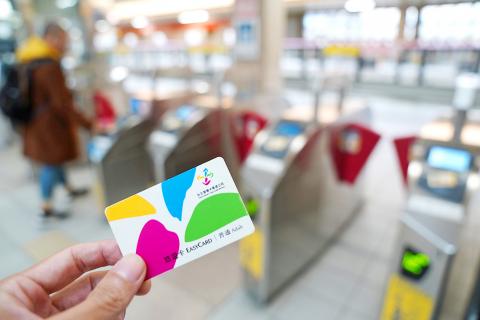People who use electronic cards to pay for rides on the Taipei MRT metropolitan rail system got their first bonus yesterday under a new fare scheme that offers frequent travelers discounts of up to 30 percent.
A special tone sounded when they swiped their cards at an MRT gate yesterday, signaling that they had qualified for a reward based on the number of rides they took last month, Taipei Rapid Transit Corp (TRTC) said.
Under the new program, those who take MRT trains 51 times or more in a month receive a 30 percent discount on their total fare for that month, TRTC said.

Photo: CNA
Those who take MRT trains 41 to 50 times per month are eligible for a 25 percent discount, while there are discounts of 20 percent for those who take 31 to 40 trips per month, 15 percent for 21 to 30 trips, and 10 percent for 11 to 20 trips, it said.
The discounts apply to EasyCard, iPass, icash, and HappyCash cards, the company said.
Taipei MRT passengers who paid for rides using the cards received a universal 20 percent discount through the end of last month, but that discount was eliminated starting yesterday in favor of the new fare system.
Despite maintaining the standard 20 percent discount last month, passengers received the frequent ridership discount for the month yesterday as a bonus, the company said.
The reward is deposited directly onto the smart card, it said.
The new system would also enable people who use electronic cards to check a record of all the journeys made in the month using the ticket machines or kiosks near information counters or on gate screens, the company said.
Meanwhile, the discount for people transferring from the metro system to a bus or vice versa within one hour remains in place, as do the discount fares for senior citizens, children and people with all-pass tickets.
The one-month all-pass ticket priced at NT$1,280, which provides unlimited rides on MRT trains, buses and YouBikes in Taipei and New Taipei City, is also still available.

The first global hotel Keys Selection by the Michelin Guide includes four hotels in Taiwan, Michelin announced yesterday. All four received the “Michelin One Key,” indicating guests are to experience a “very special stay” at any of the locations as the establishments are “a true gem with personality. Service always goes the extra mile, and the hotel provides much more than others in its price range.” Of the four hotels, three are located in Taipei and one in Taichung. In Taipei, the One Key accolades were awarded to the Capella Taipei, Kimpton Da An Taipei and Mandarin Oriental Taipei. Capella Taipei was described by

The Taichung District Court yesterday confirmed its final ruling that the marriage between teenage heir Lai (賴) and a man surnamed Hsia (夏) was legally invalid, preventing Hsia from inheriting Lai’s NT$500 million (US$16.37 million) estate. The court confirmed that Hsia chose not to appeal the civil judgement after the court handed down its ruling in June, making the decision final. In the June ruling, the court said that Lai, 18, and Hsia, 26, showed “no mutual admiration before the marriage” and that their interactions were “distant and unfamiliar.” The judge concluded that the couple lacked the “true intention of

EVA Airways today confirmed the death of a flight attendant on Saturday upon their return to Taiwan and said an internal investigation has been launched, as criticism mounted over a social media post accusing the airline of failing to offer sufficient employee protections. According to the post, the flight attendant complained of feeling sick on board a flight, but was unable to take sick leave or access medical care. The crew member allegedly did not receive assistance from the chief purser, who failed to heed their requests for medical attention or call an ambulance once the flight landed, the post said. As sick

INDUSTRY: Beijing’s latest export measures go beyond targeting the US and would likely affect any country that uses Chinese rare earths or related tech, an academic said Taiwanese industries could face significant disruption from China’s newly tightened export controls on rare earth elements, as much of Taiwan’s supply indirectly depends on Chinese materials processed in Japan, a local expert said yesterday. Kristy Hsu (徐遵慈), director of the Taiwan ASEAN Studies Center at the Chung-Hua Institution for Economic Research, said that China’s latest export measures go far beyond targeting the US and would likely affect any country that uses Chinese rare earths or related technologies. With Japan and Southeast Asian countries among those expected to be hit, Taiwan could feel the impact through its reliance on Japanese-made semi-finished products and